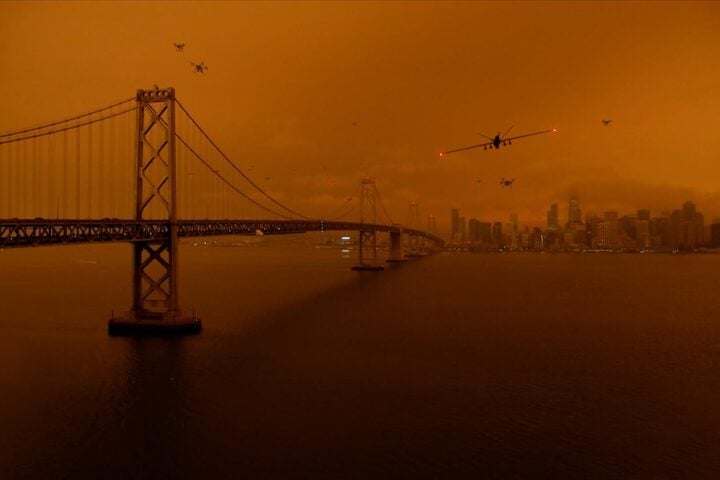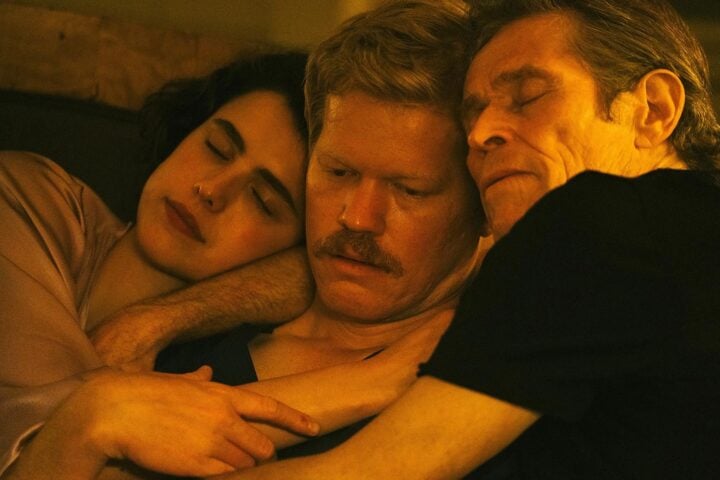Say what you will about Darren Aronofsky, but his devotion to Grand Guignol exhibitionism is never boring. In his latest film, The Whale, Brendan Fraser plays the middle-aged Charlie, a morbidly obese man endeavoring to eat himself to death. Throughout, Aronofsky invites us to gawk at Fraser’s prosthetic-enhanced appearance as his character showers, masturbates, and precariously moves around his rundown Idaho apartment with the aid of a rickety walker. When the man binges on meatball sandwiches or chocolate bars, it’s shot and scored with the bombastic revulsion of a horror movie.
Despite these moments, though, The Whale does find Aronofsky reining in his typically ostentatious style, if not in the same way that he did with The Wrestler, which struck the ideal balance between clear-eyed realism and intense craftsmanship. Based on screenwriter Samuel D. Hunter’s play of the same name, the film is nothing if not stagy, at times even suggesting a recording of a live performance. It’s an initially intriguing approach, with the claustrophobia of the one-room setting intermittently suggesting a ship out at sea, like the Pequod from Herman Melville’s Moby Dick, which is often referenced and alluded to in the film.
This artificiality also extends to the big and sincere emotions of The Whale’s characters, although in this regard it seems far less deliberate. Years prior, Charlie was a professor who left his wife, Mary (Samantha Morton), for one of his male students, who then killed himself sometime later. Now, after letting his weight get out of control, Charlie is living a solitary existence as an online writing instructor (at one point, he implores his students to “write something honest,” while, of course, keeping his webcam shut off). His only lifeline to sanity is Liz (Hong Chau), a friend and the sister of his deceased partner, who makes regular visits to nurse Charlie while pleading in vain for him to go to the hospital before he has a coronary.
Charlie’s weight issue is never anything more complex than a direct result of his capital-T trauma. But considering how Libatique’s camera leeringly treats Charlie as an unsightly object of pity throughout, it’s difficult to deny the film’s fatphobia, though its mawkishness is no less oppressive. When Charlie’s teenage daughter, Ellie (Sadie Sink), shows up at his door, angry and scornful at the father who disappeared from her life, it’s presented as a chance for Charlie to mend the psychological wreckage that his decisions have had on others and, somehow, chart a constructive way forward. But almost as soon as she opens her mouth, Ellie’s default mode is to take nasty jabs at Charlie’s “disgusting” appearance and sexual orientation, at which point her stilted, subtext-blaring words become The Whale’s guiding principle.
It’s easy to see what drew the director of Noah to Hunter’s play, given how it dabbles into the realm of religious belief, albeit superficially. A young door-to-door missionary, Thomas (Ty Simpkins), arrives at Charlie’s apartment during one of many moments when he’s indisposed and in need of help. Thomas takes this as a sign from God that he must stick around to also spiritually save the poor man, spurring on an ongoing series of blunt back-and-forths with Charlie, Ellie, and Liz, who are all to varying degrees cynical and atheistic.
All of this unsubtle narrative busywork betrays the fact that the material scarcely wrestles with its ideas about faith and empathy. Worse, neither Aronofsky nor his cast seem to really care about the reality of what it’s like to live with weight issues, at least not past what it can do to enhance an ostensibly artistic dramatic scenario. The effect is cold and calculated, right down to the performers, who spend the film trying to out-shout each other, their every word ultimately hanging dead in the air, flattening the emotional impact that they’re desperately straining for.
The Whale has been touted as a comeback for Fraser, whose talents have been underrated throughout this career, even when he was specializing in broadly comedic roles. But while it’s gratifying at times to see him put that signature puppy dog face to impassioned effect here, even his boundless expressiveness is bogged down by the film’s solemnity. “I just want to know I did one good thing in my life!” Charlie shouts near the end of The Whale, emerging out of his self-defeating funk to vocalize his growing urgency to be the supportive father he once was. But the film doesn’t give Fraser the space to intuitively build to this climactic moment, instead relying on the fussy dialogue to spell out the emotions for him. Aronofsky may think he’s presenting some kind of radically cathartic journey throughout The Whale, but all he’s doing is bringing a hollow sense of dignity to his schematic brand of cinematic misery porn.
Since 2001, we've brought you uncompromising, candid takes on the world of film, music, television, video games, theater, and more. Independently owned and operated publications like Slant have been hit hard in recent years, but we’re committed to keeping our content free and accessible—meaning no paywalls or fees.
If you like what we do, please consider subscribing to our Patreon or making a donation.






Looks like a great movie – can’t wait to see it
Very well written review.
This article was written by a fat person.
Absolute garbage and chronically online take. There is nothing fatphobic about showing the reality and health issues that come with morbid obesity. This film was beautiful and emotionally harrowing. You watched the film, but clearly did not understand it.
First, I’ll say I have no ill will toward anyone who doesn’t like this film, but I have a certain perspective from which I can speak, and I’d like to focus on that.
I’ll start by saying I’m 40 years old, and I’m a morbidly obese person with a binge eating disorder. At my heaviest I was 447 lbs. The only difference between me and Charlie in regards to our disorders is that I haven’t given up yet and gone all in on eating myself to death.
Focusing only on the obesity element here, my take is that this film was an honest, raw portrayal of dealing with binge eating. Anyone who thinks this film is mocking fat people or being exploitive of Charlie are either not obese with an eating disorder, or they are in denial about it.
The way he stress eats after Googling health sympthoms? I’ve done that as recently as last week.
The way he’s eating in the third act? I’ve seen people describe it as cartoonish and mean spirited. But here’s the dirty little secret: I’ve done that, right down to pouring out a loaf of bread and putting potato chips on it and eating it. I’ve put lunch meat on pizza and eaten it. Multiple slices of pizza on top of one another? Classic. Vomiting directly after a manic eating episode? Unavoidable.
I’ve done all of that. And more. Crackers dipped in mayonnaise? Yep. Fried chicken covered in mashed potatoes filled with ranch dressing and ketchup? You bet. A 20 taco box from Taco Bell dipped in queso sauce? To my shame.
And worse.
And yes, it gets nasty. It gets gross. And watching it happen on screen made me feel seen for the first time in a long time.
The fact that some people think that third act binge scene is funny and not horrifying really just says more about them than the film.
It is a self destructive illness. I’m mentally ill. I see a therapist once per week just to try to deal with it. I saw my therapist this morning and I was a complete and total wreck for the entire hour, because I’ve been dealing with these issues for 20 years.
I’m lonely. I’m unloved. I have no partner, no children, no future. It takes a maximum effort for me not to end up like Charlie. I’m currently 347 lbs, but it has taken me a decade to get here from 447. And I could undo it all in the blink of an eye.
I have major empathy for Charlie despite all his flaws, and I don’t think anyone should feel as though the film is exploiting his weight or eating disorder. It is the most genuine thing about the film.
As an aside: I’ve noticed that a number of the reviewers calling this movie fatphobic — not all, but a lot — are people who are not exactly what I’d call fat. I don’t know why this is, but I genuinely find it interesting.